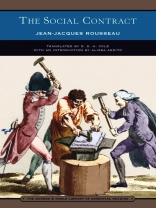‘Man is born free; and everywhere he is in chains.’ With those words, quite possibly the most famous in all political thought, Jean-Jacques Rousseau launches
The Social Contract. It is a work that loomed over the French Revolution, haunted subsequent generations, and stalks the twenty-first century. Composed in the autumn of the Old Regime,
The Social Contract presents a radical new form of political community composed of free and equal citizens who collectively retain ultimate authority; today it remains the most compelling counter-model to modern representative liberal democracy. Complex and deeply unnerving,
The Social Contract challenges its readers to rethink their understanding of freedom and servitude, the common good, and the very legitimacy of contemporary governments.
About the author
Democratic hero, literary cult figure, victim of political persecution, founding father of the Romantic Movement, Jean-Jacques Rousseau (1712-1778) remains a figure of titanic cultural significance. Rousseau was born in Geneva, and at sixteen, he left for Bourbon France where he worked his way up from lackey, to tutor, to secretary, finally to writer and literary celebrity. When he turned to examine society and politics, he did so from the perspective of people at the bottom, the poor, the disadvantaged, and others without hope of improving their lot in life.












